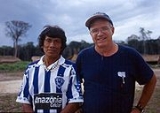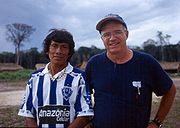
William Balée
Encyclopedia
William Balée is a professor of anthropology
and environmental studies
at Tulane University
in New Orleans, Louisiana
. He was born in the Miami, Florida area and educated at the University of Florida
He was born in the Miami, Florida area and educated at the University of Florida
, Gainesville
, where he received a B.A. in Anthropology before moving on to Columbia University
in New York City
where he earned his Ph.D. in Anthropology.
After earning his Ph.D., Balée worked for the New York Botanical Garden
, collecting plants for an ethnobotany
project sponsored by a Noble Grant. Later he took up a job with the Museu Goeldi in Belém
, Brazil.
His primary ethnographic work was with the Ka'apor
indigenous culture of Maranhão
, Brazil
(Balée 1994). During his time in Brazil, however, he also carried out fieldwork with the Tembe, the Asurini of the Xingu River
, the Arawete of the Ipishuna, which is also a tributary of the Xingu, and the Guaja.
However, he is most renowned as a proponent and foremost expert of historical ecology
(Balée 1998).
Currently, he is undertaking ethnographic fieldwork studying the historical ecology and legal activities of the Sirionó people in eastern Bolivia
.
Anthropology
Anthropology is the study of humanity. It has origins in the humanities, the natural sciences, and the social sciences. The term "anthropology" is from the Greek anthrōpos , "man", understood to mean mankind or humanity, and -logia , "discourse" or "study", and was first used in 1501 by German...
and environmental studies
Environmental studies
Environmental studies is the academic field which systematically studies human interaction with the environment. It is a broad interdisciplinary field of study that includes the natural environment, built environment, and the sets of relationships between them...
at Tulane University
Tulane University
Tulane University is a private, nonsectarian research university located in New Orleans, Louisiana, United States...
in New Orleans, Louisiana
Louisiana
Louisiana is a state located in the southern region of the United States of America. Its capital is Baton Rouge and largest city is New Orleans. Louisiana is the only state in the U.S. with political subdivisions termed parishes, which are local governments equivalent to counties...
.

University of Florida
The University of Florida is an American public land-grant, sea-grant, and space-grant research university located on a campus in Gainesville, Florida. The university traces its historical origins to 1853, and has operated continuously on its present Gainesville campus since September 1906...
, Gainesville
Gainesville, Florida
Gainesville is the largest city in, and the county seat of, Alachua County, Florida, United States as well as the principal city of the Gainesville, Florida Metropolitan Statistical Area . The preliminary 2010 Census population count for Gainesville is 124,354. Gainesville is home to the sixth...
, where he received a B.A. in Anthropology before moving on to Columbia University
Columbia University
Columbia University in the City of New York is a private, Ivy League university in Manhattan, New York City. Columbia is the oldest institution of higher learning in the state of New York, the fifth oldest in the United States, and one of the country's nine Colonial Colleges founded before the...
in New York City
New York City
New York is the most populous city in the United States and the center of the New York Metropolitan Area, one of the most populous metropolitan areas in the world. New York exerts a significant impact upon global commerce, finance, media, art, fashion, research, technology, education, and...
where he earned his Ph.D. in Anthropology.
After earning his Ph.D., Balée worked for the New York Botanical Garden
New York Botanical Garden
- See also :* Education in New York City* List of botanical gardens in the United States* List of museums and cultural institutions in New York City- External links :* official website** blog*...
, collecting plants for an ethnobotany
Ethnobotany
Ethnobotany is the scientific study of the relationships that exist between people and plants....
project sponsored by a Noble Grant. Later he took up a job with the Museu Goeldi in Belém
Belém
Belém is a Brazilian city, the capital and largest city of state of Pará, in the country's north region. It is the entrance gate to the Amazon with a busy port, airport and bus/coach station...
, Brazil.
His primary ethnographic work was with the Ka'apor
Ka'apor
The Ka'apor are a distinct ethnic group of indigenous Brazilians living on a protected reserve in the state of Maranhão. They were the subject of a book by anthropologist Dr...
indigenous culture of Maranhão
Maranhão
Maranhão is a northeastern state of Brazil. To the north lies the Atlantic Ocean. Maranhão is neighbored by the states of Piauí, Tocantins and Pará. The people of Maranhão have a distinctive accent...
, Brazil
Brazil
Brazil , officially the Federative Republic of Brazil , is the largest country in South America. It is the world's fifth largest country, both by geographical area and by population with over 192 million people...
(Balée 1994). During his time in Brazil, however, he also carried out fieldwork with the Tembe, the Asurini of the Xingu River
Xingu River
The Xingu River , also called Rio Xingu, is a 1,230-mile long, river in north Brazil; it is a southeast tributary of the Amazon River.-Description and history:...
, the Arawete of the Ipishuna, which is also a tributary of the Xingu, and the Guaja.
However, he is most renowned as a proponent and foremost expert of historical ecology
Historical ecology
Historical ecology is a research program that focuses on the interaction between humans and the environments in which they live. Rather than concentrating on one specific event, historical ecology aims to study and understand this interaction across both time and space in order to gain a full...
(Balée 1998).
Currently, he is undertaking ethnographic fieldwork studying the historical ecology and legal activities of the Sirionó people in eastern Bolivia
Bolivia
Bolivia officially known as Plurinational State of Bolivia , is a landlocked country in central South America. It is the poorest country in South America...
.

